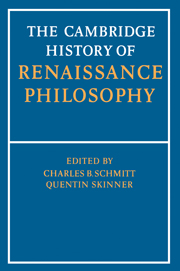Book contents
- Frontmatter
- Introduction
- PART 1 THE INTELLECTUAL CONTEXT
- PART 2 PHILOSOPHY AND ITS PARTS
- 6 Logic and language: Traditional logic
- 7 Logic and language: Humanistic logic
- 8 Natural philosophy: Traditional natural philosophy
- 9 Natural philosophy: The new Philosophy of nature
- 10 Natural philosophy: Astrology and magic
- 11 Moral philosophy
- 12 Political philosophy
- 13 Psychology: The concept of psychology
- 14 Psychology: The organic soul
- 15 Psychology: The intellective soul
- 16 Metaphysics
- 17 Problems of knowledge and action: Fate, fortune, providence and human freedom
- 18 Problems of knowledge and action: Theories of knowledge
- 19 Problems of knowledge and action: Epistemology of the sciences
- 20 Philosophy and humanistic disciplines: Rhetoric and poetics
- 21 Philosophy and humanistic disciplines: The theory of history
- PART 3 SUPPLEMENTARY MATERIAL
- Biobibliographies
- Bibliography
- Index nominun
- Index rerum
- References
14 - Psychology: The organic soul
from PART 2 - PHILOSOPHY AND ITS PARTS
Published online by Cambridge University Press: 28 March 2008
- Frontmatter
- Introduction
- PART 1 THE INTELLECTUAL CONTEXT
- PART 2 PHILOSOPHY AND ITS PARTS
- 6 Logic and language: Traditional logic
- 7 Logic and language: Humanistic logic
- 8 Natural philosophy: Traditional natural philosophy
- 9 Natural philosophy: The new Philosophy of nature
- 10 Natural philosophy: Astrology and magic
- 11 Moral philosophy
- 12 Political philosophy
- 13 Psychology: The concept of psychology
- 14 Psychology: The organic soul
- 15 Psychology: The intellective soul
- 16 Metaphysics
- 17 Problems of knowledge and action: Fate, fortune, providence and human freedom
- 18 Problems of knowledge and action: Theories of knowledge
- 19 Problems of knowledge and action: Epistemology of the sciences
- 20 Philosophy and humanistic disciplines: Rhetoric and poetics
- 21 Philosophy and humanistic disciplines: The theory of history
- PART 3 SUPPLEMENTARY MATERIAL
- Biobibliographies
- Bibliography
- Index nominun
- Index rerum
- References
Summary
Most modern discussions of Renaissance psychology focus on a single aspect of the subject: the debates over immortality and intellection in late fifteenth- and sixteenth-century Italy. These debates were important and far-reaching (see Kessler in this volume), but to concentrate exclusively on them does not do justice to the much broader set of issues that preoccupied Renaissance writers on philosophical psychology. In particular it slights their real interest in what they sometimes called the ‘organic soul’ – the principle responsible for those life functions inextricably tied to the bodies of living beings and immediately dependent on their organs. These functions ranged from the vital operations of digestion and reproduction through sensation and emotion to the higher cognitive functions of imagination and memory. They excluded only the two faculties of intellect and will, which according to most philosophers did not require physical organs and could therefore subsist after the body's death; peculiar to man, these latter faculties constituted his immortal soul and differed distinctly from the functions of the organic soul, which humans shared to a greater or lesser degree with plants and animals.
The tendency to concentrate on the intellectual soul and the debates which surround it obscures another, equally important aspect of Renaissance psychology: the existence of a broad consensus concerning the general nature of the organic soul and its functions. As we will see below, many specific issues were disputed even within the Aristotelian tradition; nonetheless, most philosophers, whatever their particular orientation or school, subscribed to a large body of common ideas on the subject.
- Type
- Chapter
- Information
- The Cambridge History of Renaissance Philosophy , pp. 464 - 484Publisher: Cambridge University PressPrint publication year: 1988
References
- 59
- Cited by



